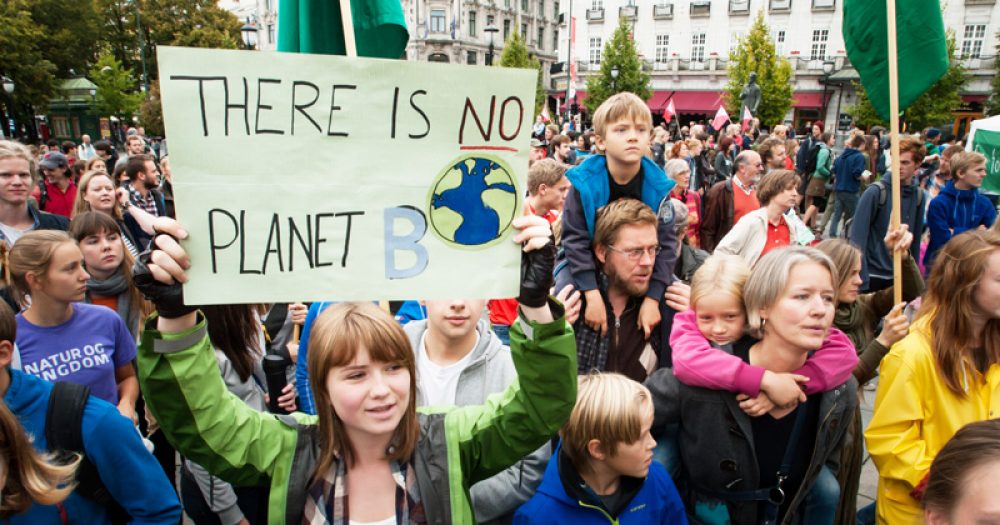With a debate raging about whether pupils are taught enough about climate change at school, Fiona Carnie offers some simple suggestions of steps schools can take to address the issues for themselves
“There is no Planet B” is a regular refrain heard on the now weekly school climate strikes across the globe. At the last count 2052 demonstrations took place in 123 countries. This campaign is not going away any time soon.
Growing numbers of headteachers and academics are supporting young people in their action to put pressure on governments to take the climate crisis seriously. Time is running out and young people know that that they are the ones who will suffer.
So what can schools do to support young people? Here are ten suggestions.
1. Food
Go vegetarian. Buy local, organic food where possible. Animals emit methane and other greenhouse gases and so a meat-free diet contributes to a reduction in global warming. Over 100 schools have signed up to Meat-free Mondays and are including meat-free options on other days – but there is much more that can be done. St Christopher’s School in Hertfordshire is just one of several schools that provide vegetarian lunches for all on a daily basis.
2. Travel
Stop school trips that involve flying. Tourism accounts for almost 10% of global carbon emissions. Go by train instead. Explore local landscapes. Get involved in social or environmental projects. Students will learn just as much.
3. Curriculum
Explore links to climate change across all subject areas. At Garlinge Primary School in Margate, environmental education is not taught in isolation but is linked to all areas of the curriculum: geography, science, English, mathematics, art, D&T, music, history, PSHE, drama and PE.
4. Materials
Recycle everything. Ban single-use plastic. Buy environmentally friendly, fair-trade products where possible. Use biodegradable cleaning materials. St Martin’s Primary School in Devon has a recycling policy which commits students and staff to “reduce the amount of materials we use and waste we produce, re–use materials wherever possible, restore what is deemed to have been destroyed and respect our neighbours and our environment.”
5. Energy
Switch off lights. Turn down the heating. Wear extra clothes. Insulate and ventilate. Meadow Primary School in Surrey has installed 117 solar panels. Chew Valley School in Somerset has installed its own wind turbine which generates enough electricity to save the school approximately £1,000 per annum. Edmondsley Primary School in Durham has taken part in the School Carbon Reduction Programme and has a clear policy to learn about and reduce energy consumption. They say, “There are no passengers on spaceship Earth. We are all crew.”
6. Clothing
Avoid cheap uniforms imported from far afield. At Verulam School in St Albans, parents run a second-hand uniform shop.
7. Banking
Switch to an ethical bank account. Universities are coming under pressure to invest in ways that do not support the fossil fuel industry or the arms trade. It is time for schools to consider ethical banking as well.
8. Transport
Encourage walking and cycling to school. Research from the University of Strathclyde finds that exercise is an indispensable part of children’s health and wellbeing. Glyncollen Primary School in Swansea took part in the Safer Routes to School initiative and their activities in the local community are showcased on the Pupil Voice Wales website.
9. School grounds
Grow your own veg. Teach children how to garden. Plant trees. According to the Soil Association, gardening in school brings benefits to everyone – improved health and wellbeing, better levels of attention in class, higher achievement and stronger links with the local community. Some schools have even created mini farms. The children and staff at West Primary School in Paisley in Scotland have won awards for their gardening activities. The Warriner School in Oxfordshire has a mixed 120-acre farm with a range of livestock that are reared on organic grassland.
And finally…
10. Participation
Why not set up a Climate Crisis Committee (consisting of students, staff, parents and members of the local community) to explore what your school can do to make a difference?
This is a golden opportunity for adults and children to work together on a shared mission that matters to us all. If schools fail in this their students are likely to see education as increasingly irrelevant to the global crisis engulfing us. Let’s rise to the challenge.
Fiona Carnie is author of Rebuilding our Schools from the Bottom Up (Routledge, 2018)








Schools jeopardise their status as genuine community institutions when they encourage political activism involving contentious issues. We are setting a very bad precedent–with the rise of populism, who is to say what issues will become popular in the future?
By all means children should learn about the problems mankind faces, but they should be given access to contrarian views and allowed to make their own decisions. Turning issues into moral crusades does nothing to promote good scholarship.
The suggested ideas can be justified as ways of reducing pollution and over-consumption. Nothing ‘contentious’, surely, in taking steps to address these irrespective of whether they contribute to climate change.
Janet–Items 1, 3 and 10 are all highly political.
Good Article, may we link to it/promote it on our website?
We are trying to encourage more schools to use our online tools to help their school go solar too, (you can look up the solar potential and then design a system for your own school) we then use some of the budged from manage the panels to come in to schools and deliver energy literacy and climate talks.
Of course, Robert! Please share wherever you like.
at our school every year in year 8 we do a climate project and the winners get their idea done on the school I’m doing my ideas starter right now this helped a lot thanks